Baking up innovation in the sandwich-making world, the 4-slice sandwich maker OEM landscape offers a myriad of possibilities for those looking to craft the perfect product. With a focus on customization, quality, and efficiency, these Original Equipment Manufacturers (OEMs) have become pivotal players in the industry. As the demand for versatile and user-friendly sandwich makers continues to rise, delving into the realm of OEMs for your 4-slice sandwich maker is a strategic move that can yield exceptional results.
Introduction to 4-Slice Sandwich Makers
4-Slice Sandwich Makers have become a staple in home kitchens and commercial settings alike. These versatile appliances are designed to cater to the sandwich lover’s needs, providing a quick and convenient way to enjoy a delicious meal. But what exactly sets a 4-slice sandwich maker apart from its counterparts? Let’s dive into the world of these nifty gadgets.
At its core, a 4-slice sandwich maker is a kitchen appliance that allows you to cook sandwiches, paninis, and even grilled cheese in mere minutes. The name “4-slice” refers to the number of slices of bread it can accommodate at one time, making it ideal for those who like to make sandwiches in batches or for larger families. The design typically features two plates that close together to cook the bread, applying heat and pressure to create a perfectly toasted and cooked sandwich.
One of the standout features of a 4-slice sandwich maker is its versatility. These machines can handle a variety of bread types, from classic white and whole wheat to artisanal loaves and even brioche. This means you can enjoy everything from classic ham and cheese to gourmet creations with avocado and smoked salmon.
The construction of a 4-slice sandwich maker is often robust and durable. Many models are made with stainless steel or non-stick surfaces, ensuring that your appliance can withstand the rigors of regular use and maintain its sleek appearance. Some units also come with adjustable heat settings, allowing you to customize the cooking temperature to your preference.
In the world of kitchen appliances, the term “OEM” stands for Original Equipment Manufacturer. When it comes to 4-slice sandwich makers, OEM refers to companies that specialize in producing these devices for other businesses, rather than selling them directly to consumers. This means that if you’re looking to add a 4-slice sandwich maker to your product line, you can benefit from the expertise and efficiency of an OEM.
The process of working with an OEM is quite straightforward. You provide your specifications, and the OEM takes care of the rest. They source the necessary materials, design the product, and assemble it according to your exact requirements. This can be particularly advantageous if you’re looking for a custom-made sandwich maker that fits your brand or specific market needs.
One of the primary benefits of choosing an OEM for your 4-slice sandwich maker is the level of customization available. You can specify the size and shape of the sandwich plates, the material used for the exterior, and even the color of the appliance. This ensures that your product not only functions well but also aligns with your brand identity and appeals to your target market.
In addition to customization, working with an OEM can also save you time and money. By outsourcing the manufacturing process, you can focus on other aspects of your business, such as marketing and distribution. OEMs often have streamlined production processes and can provide volume discounts, making it more cost-effective for you to produce your sandwich makers in large quantities.
When selecting an OEM for your 4-slice sandwich maker, it’s important to consider a few key features. First and foremost, the quality of the materials used should be top-notch. The appliance should be able to withstand regular use without losing its functionality or appearance. Secondly, the design should be user-friendly, with clear instructions and a straightforward interface. Lastly, the OEM should be willing to work closely with you to ensure that your product meets all of your expectations.
In today’s market, there are numerous OEMs specializing in the production of 4-slice sandwich makers. Each has its own unique strengths and specialties. For instance, some OEMs may excel in creating high-end, gourmet models, while others may focus on more budget-friendly, no-frills designs. Choosing the right OEM for your business is about finding a partner who shares your vision and can deliver on your goals.
Several companies have already capitalized on the benefits of working with an OEM for their 4-slice sandwich makers. For example, a local café might have chosen an OEM to create a custom sandwich maker that matches their restaurant’s décor, or a large grocery chain might have opted for an OEM to produce a high-volume, cost-effective model that can be found in their stores across the country.
In conclusion, the world of 4-slice sandwich makers is vast and offers a wide range of options for consumers and businesses alike. By partnering with an OEM, you can tap into the expertise and efficiency of these manufacturers to create a sandwich maker that perfectly fits your needs. From customization to cost savings, the benefits of choosing a 4-slice sandwich maker OEM are clear, and the possibilities are as endless as the sandwich combinations you can create.
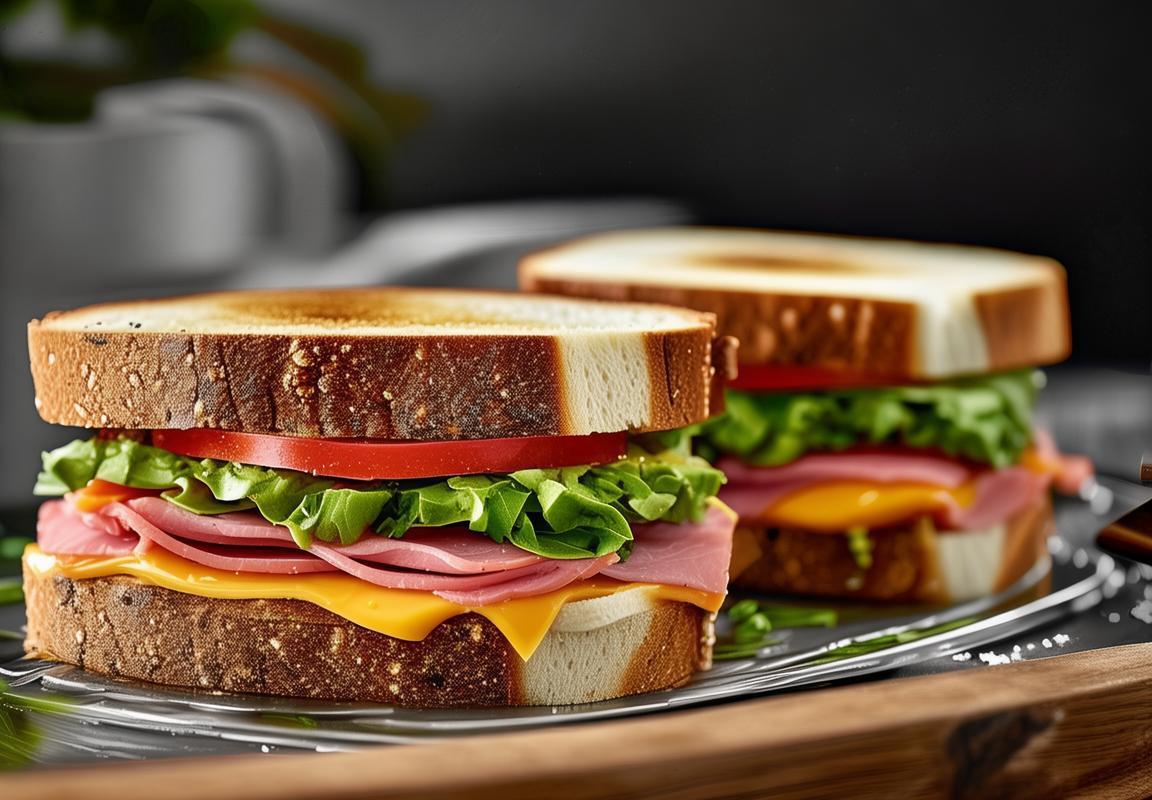
Understanding OEM in the Sandwich Maker Industry
In the bustling world of kitchen appliances, the term “OEM” stands tall as a cornerstone for many businesses looking to create their own branded products. OEM, or Original Equipment Manufacturer, refers to a company that produces goods or components that are sold to another company for use in their own brand. This concept is particularly prevalent in the sandwich maker industry, where the demand for high-quality, customizable appliances is on the rise.
The sandwich maker market is diverse, catering to both home users and commercial establishments like cafes, delis, and restaurants. Within this sector, OEMs play a pivotal role in providing the core technology that powers these appliances. By understanding the intricacies of OEM partnerships in the sandwich maker industry, businesses can gain a competitive edge and offer their customers innovative solutions.
One of the primary benefits of working with an OEM in the sandwich maker industry is the ability to tailor products to specific market needs. OEMs often have a wealth of experience in designing and manufacturing appliances that can be customized with various features, such as different heating elements, non-stick surfaces, and programmable settings. This flexibility allows manufacturers to create sandwich makers that cater to the unique preferences of their target audience.
Moreover, OEMs are well-versed in the latest technological advancements, ensuring that the sandwich makers they produce are not only functional but also efficient and user-friendly. From energy-saving capabilities to modern aesthetics, OEMs can incorporate these elements into the design, making the final product more appealing to consumers.
Another crucial aspect of OEM partnerships is the quality control that comes with it. Reputable OEMs adhere to stringent manufacturing standards, ensuring that each sandwich maker that leaves their facility meets the highest quality benchmarks. This level of assurance is invaluable for businesses looking to establish a reputation for reliability and durability in the marketplace.
When it comes to the sandwich maker industry, OEMs also understand the importance of compliance with safety regulations. They are adept at incorporating safety features that protect both the user and the appliance, such as automatic shut-off mechanisms and heat-resistant materials. This compliance not only protects the end-user but also helps manufacturers avoid potential legal issues and recalls.
Collaborating with an OEM also means gaining access to a wealth of resources and expertise. OEMs often have in-house design teams, testing facilities, and supply chain networks that can streamline the product development process. This collaboration can lead to faster time-to-market and a more cost-effective production process, as OEMs can leverage their existing infrastructure and economies of scale.
In the sandwich maker industry, OEMs also play a role in driving innovation. They are constantly exploring new materials, heating technologies, and design concepts that can revolutionize the way people enjoy their sandwiches. By working with an OEM, businesses can tap into this innovation and bring cutting-edge products to market that stand out from the competition.
Furthermore, OEMs can offer a range of value-added services that go beyond the manufacturing of the sandwich maker itself. These services may include branding support, packaging design, and even after-sales service and support. Such comprehensive solutions can be a game-changer for manufacturers looking to create a complete product offering that resonates with customers.
It’s also worth noting that OEMs in the sandwich maker industry are often global players, with the ability to produce and distribute products on a large scale. This global reach can be a significant advantage for businesses looking to expand their market presence or enter new international markets.
In conclusion, the role of OEMs in the sandwich maker industry is multifaceted. They provide the foundational technology, customization options, quality control, safety compliance, and innovation that are essential for businesses to succeed in a competitive market. By understanding and leveraging the strengths of OEM partnerships, companies can create and deliver sandwich makers that not only meet but exceed consumer expectations.

The Benefits of Choosing a 4-Slice Sandwich Maker OEM
Opting for a 4-slice sandwich maker OEM (Original Equipment Manufacturer) offers a multitude of advantages that can significantly impact your business. From cost savings to customizability, here are some of the key benefits:
-
Cost-Effective Production: When you choose an OEM for your 4-slice sandwich maker, you’re tapping into a streamlined production process. OEMs typically have established supply chains and manufacturing capabilities that allow them to produce items at a lower cost per unit. This can translate into substantial savings for your business, especially when ordering in bulk.
-
Quality Control: Working with an OEM ensures that your sandwich makers are produced to a high standard. OEMs are committed to maintaining quality across their products, which means you can expect consistent performance and reliability from each unit. This can enhance your brand reputation and customer satisfaction.
-
Customization Options: A 4-slice sandwich maker OEM can offer a range of customization options to suit your specific needs. Whether it’s branding, design modifications, or additional features, OEMs can tailor the product to align with your brand identity and customer preferences. This level of personalization can set your product apart in a competitive market.
-
Shorter Lead Times: By working with an OEM, you can often enjoy shorter lead times compared to manufacturing the product in-house. OEMs are equipped to handle large orders and have the capacity to produce items quickly, which is particularly beneficial if you need to meet tight deadlines or fulfill a high demand.
-
Reduced Investment: Investing in new manufacturing equipment can be a significant financial burden. By choosing an OEM, you avoid the upfront costs associated with purchasing and setting up a new production line. This can free up capital for other business ventures or investments.
-
Focus on Core Competencies: When you outsource the production of your 4-slice sandwich makers to an OEM, your business can focus on its core competencies. This means you can allocate more time and resources to areas such as marketing, sales, and customer service, which can ultimately drive business growth.
-
Access to Advanced Technology: OEMs often have access to the latest manufacturing technology and techniques. This means that the sandwich makers they produce can incorporate cutting-edge features and innovations that might not be feasible for a company to develop in-house.
-
Scalability: As your business grows, so does the demand for your products. An OEM can easily scale up production to meet increased demand, ensuring that you can keep up with market trends and customer expectations without the need to invest in additional manufacturing capabilities.
-
Global Reach: Many OEMs operate on a global scale, which means they can source materials and components from all over the world. This can lead to cost savings and a wider selection of high-quality parts, enhancing the overall quality of your sandwich makers.
-
Risk Mitigation: By partnering with an experienced OEM, you can mitigate the risks associated with manufacturing. OEMs are equipped to handle quality control, regulatory compliance, and supply chain management, reducing the likelihood of production issues or delays.
-
Continuous Improvement: OEMs are often focused on continuous improvement and innovation. They may invest in research and development to enhance their products, which can benefit your business by providing you with a competitive edge.
-
Enhanced Market Entry: If you’re entering a new market or looking to expand your product line, working with an OEM can be a strategic move. They can help you navigate the complexities of new markets, including local regulations and consumer preferences.
In summary, choosing a 4-slice sandwich maker OEM can offer numerous benefits, from cost savings and quality control to customization and scalability. It’s a strategic decision that can help businesses focus on their strengths while ensuring that their products meet the highest standards and customer expectations.
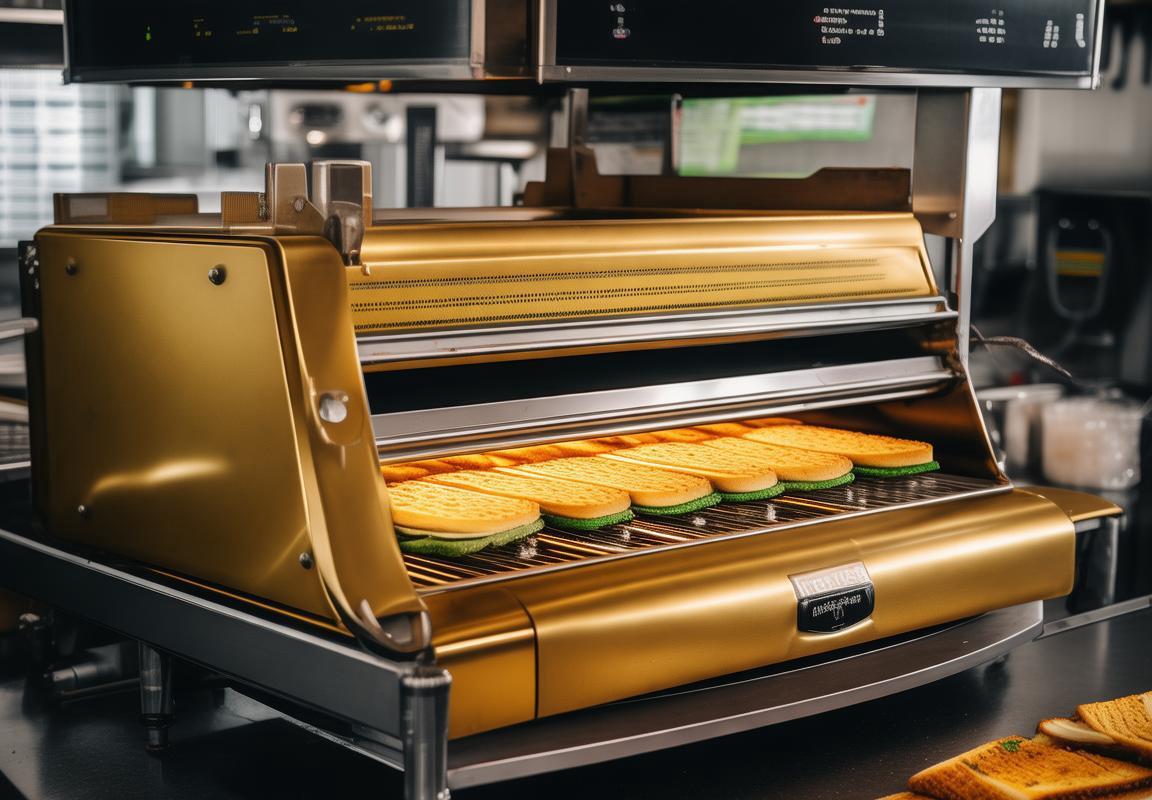
Key Features to Look for in a 4-Slice Sandwich Maker OEM
-
When selecting an OEM (Original Equipment Manufacturer) for your 4-slice sandwich maker, it’s crucial to find a partner that offers a range of key features that align with your brand’s identity and customer expectations. One such feature is a non-stick cooking surface, which not only ensures that sandwiches release effortlessly but also prolongs the life of the appliance.
-
A reliable and efficient heating element is another must-have feature. Look for an OEM that uses high-quality elements that heat up quickly and evenly, ensuring that every sandwich is cooked to perfection. This is especially important for keeping the bread crisp while melting the cheese and warming the fillings.
-
The size and shape of the sandwich slots are important for the versatility of the appliance. A 4-slice sandwich maker OEM should offer adjustable or interchangeable plates that can accommodate different sizes of bread, from thin slices to hearty whole grain loaves. This flexibility allows users to create a variety of sandwiches, from simple ham and cheese to gourmet creations.
-
Safety features should be a top priority. An OEM that includes features like a cool-touch exterior, automatic shut-off mechanisms, and a child safety lock is more likely to produce a product that customers will trust and feel confident using. These features not only enhance user safety but also reduce the risk of accidents and damage.
-
Easy-to-use controls are a key feature that often goes unnoticed but is vital for user satisfaction. Look for an OEM that offers a user-friendly interface with clear, intuitive buttons or dials. A simple, one-touch operation is ideal for busy consumers who want to prepare a sandwich without the hassle of complicated settings.
-
Consistent and even cooking is essential for a high-quality sandwich maker. An OEM that ensures uniform heating across all four slices is more likely to deliver a product that consistently produces great results. This can be achieved through precise heat distribution technology and quality craftsmanship.
-
Energy efficiency is a growing concern for consumers. An OEM that prioritizes energy-saving design can help your sandwich maker stand out in the market. Features like an auto-off function after a set period of inactivity or an indicator light that shows when the sandwich maker is in energy-saving mode can make a significant difference in the appliance’s environmental impact and cost savings for the user.
-
Customizability is a powerful feature that can differentiate your product in the market. A 4-slice sandwich maker OEM that offers various color options, materials, and branding possibilities allows you to tailor the appliance to fit your brand’s aesthetic and target audience preferences.
-
After-sales service and warranty are often overlooked but are critical for customer loyalty. An OEM that provides robust support and a comprehensive warranty can help alleviate concerns about product defects and ensure that your customers feel supported long after their purchase.
-
Lastly, consider the OEM’s reputation and track record. Look for a manufacturer that has a history of producing reliable, high-quality products. Reading reviews and testimonials from other clients can provide valuable insights into the OEM’s ability to meet your expectations and deliver on promises.
-
In summary, a 4-slice sandwich maker OEM with these key features—non-stick surfaces, efficient heating, adjustable plates, safety features, user-friendly controls, even cooking, energy efficiency, customizability, excellent after-sales service, and a strong reputation—will be a valuable partner in bringing your brand’s sandwich maker to market. By focusing on these elements, you can ensure that your product stands out for its performance, quality, and user experience.

How OEMs Can Customize Your 4-Slice Sandwich Maker
Customization is a game-changer in the world of 4-slice sandwich makers, offering a unique opportunity for businesses to stand out in a competitive market. Here’s how Original Equipment Manufacturers (OEMs) can tailor your sandwich maker to fit your brand’s identity and customer needs:
-
Brand Integration: OEMs can seamlessly integrate your brand’s logo, colors, and design elements into the sandwich maker. This not only reinforces brand recognition but also ensures that your product is immediately associated with your brand, creating a strong visual identity.
-
Material Choices: The choice of materials is crucial in the customization process. OEMs can offer a variety of materials, from durable stainless steel to sleek aluminum, allowing you to select the one that aligns with your product’s quality standards and aesthetic preferences.
-
Size and Shape: While the standard 4-slice sandwich maker is a common format, OEMs can modify the size and shape to better suit your space or unique product offerings. This could include compact models for countertop spaces or larger units for high-volume operations.
-
Additional Features: OEMs can add or remove features based on your requirements. For instance, you might want a model with adjustable heat settings, non-stick surfaces, or even a built-in timer. These customizations can enhance the user experience and cater to specific customer preferences.
-
Safety and Compliance: Ensuring that your sandwich maker meets safety standards is paramount. OEMs can customize the product to include safety features like cool-touch handles, childproof locks, and compliance with international safety regulations, giving you peace of mind and regulatory approval.
-
Power Source: Depending on your market or customer base, you might need a sandwich maker that operates on different power sources. OEMs can customize your sandwich maker to be dual-voltage, or even battery-operated, for greater versatility and ease of use.
-
Functionality and Innovation: OEMs can push the boundaries of what a sandwich maker can do. This could involve integrating smart technology, such as Bluetooth connectivity for remote control, or even developing a model that can be used as a multi-functional appliance for other food items.
-
Custom Packaging: The presentation of your product is as important as the product itself. OEMs can design custom packaging that reflects your brand’s image, including graphics, messaging, and even the material used, ensuring a cohesive brand experience from start to finish.
-
User Interface: The interface of the sandwich maker can be customized to be intuitive and user-friendly. This might include digital displays, tactile buttons, or even voice-controlled features, depending on the target market and user demographics.
-
Service and Maintenance: OEMs can also customize the service and maintenance aspects of the sandwich maker. This could involve providing specific tools or guides for easy cleaning and maintenance, or even offering a warranty that is tailored to your brand’s service standards.
-
Sustainability: With growing concerns about the environment, OEMs can incorporate sustainable practices into the customization process. This could mean using eco-friendly materials, designing for disassembly for recycling, or ensuring the product has a long lifespan to reduce waste.
-
Volume and Efficiency: For large-scale operations, OEMs can optimize the sandwich maker’s design for high-volume production, ensuring efficiency and reliability. This might involve engineering the unit for faster heating times, easier cleaning, or more durable components.
-
Market Research and Feedback: Before finalizing the customization, OEMs can conduct market research and gather feedback from potential users. This ensures that the customizations are not only unique but also meet the actual needs and expectations of your target market.
-
Collaborative Development: Throughout the customization process, OEMs often work closely with the client to refine designs and ensure that every aspect of the sandwich maker aligns with the client’s vision and brand values.
-
Final Quality Assurance: Once the customizations are complete, OEMs typically conduct rigorous quality assurance tests to ensure that the final product meets all specifications and standards, providing a high-quality end product to the client.
By working with an OEM to customize your 4-slice sandwich maker, you’re not just buying a product; you’re investing in a partnership that can help you create a unique, market-ready solution that resonates with your customers and sets your brand apart.
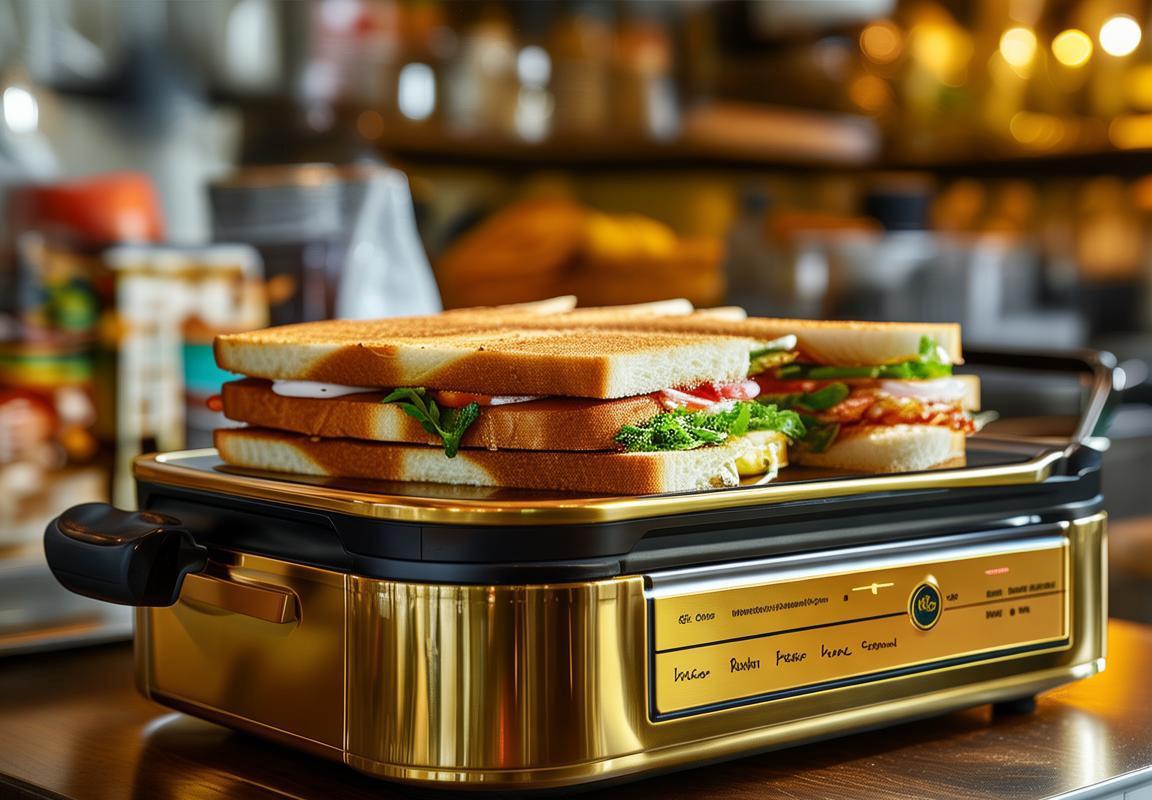
The Process of Working with a 4-Slice Sandwich Maker OEM
Navigating the intricate world of OEM partnerships for your 4-slice sandwich maker can seem daunting, but understanding the process can make all the difference. From initial contact to final delivery, here’s what you can expect when working with a 4-slice sandwich maker OEM.
-
Initial Inquiry and CommunicationWhen you reach out to an OEM, the process often begins with a straightforward inquiry. You might discuss your specific requirements, such as the size of the sandwiches the maker should handle, the materials used, and any unique features you’re looking for. Effective communication is key, ensuring that both parties are on the same page.
-
Design and PrototypingOnce your initial requirements are understood, the OEM will begin the design phase. This involves creating sketches or 3D models of the sandwich maker. The design team will consider factors like user safety, ease of use, and aesthetic appeal. Prototypes are then created, which allow you to visualize and test the product before moving forward.
-
Material Selection and Quality ControlThe choice of materials is crucial for the durability and performance of your sandwich maker. The OEM will guide you through various options, from stainless steel for the exterior to high-quality non-stick coatings for the interior. Quality control measures are put in place to ensure that each component meets the stringent standards you’ve set.
-
Tooling and ManufacturingTooling is the process of creating the molds and dies necessary for mass production. This is a critical step, as the quality of the tooling directly impacts the final product. The OEM will manage this process, ensuring that the tooling is precise and efficient. Manufacturing follows, where the sandwich makers are assembled and tested for functionality.
-
Testing and IterationBefore the product goes to market, thorough testing is essential. The OEM will subject the sandwich makers to various stress tests, including temperature changes, durability tests, and user interface checks. If any issues arise, the design may be adjusted, and further prototypes may be made.
-
Certifications and ComplianceDepending on your target market, there may be specific certifications required for your 4-slice sandwich maker. The OEM will handle the necessary paperwork and ensure that your product complies with all relevant safety and regulatory standards.
-
Volume Production and SchedulingOnce the design is finalized and certifications are obtained, the OEM will move into volume production. Scheduling is a delicate balance between meeting your deadlines and maintaining quality. The OEM will work with you to establish a timeline that ensures timely delivery.
-
Packaging and LogisticsPackaging is not just about protecting the product; it’s also about creating a positive brand impression. The OEM will design packaging that not only safeguard the sandwich makers but also align with your brand identity. Logistics then come into play, with the OEM arranging for the safe transport of your products to their final destination.
-
Support and After-Sales ServiceA good OEM will offer comprehensive support and after-sales service. This includes assistance with installation, maintenance, and troubleshooting. They should be readily available to address any issues that arise post-production and ensure customer satisfaction.
-
Feedback and Continuous ImprovementAfter your sandwich makers are in use, feedback from customers is invaluable. The OEM should be open to suggestions and improvements, using this feedback to refine their product and enhance your brand’s offerings. This cycle of feedback and improvement is what keeps the OEM competitive and your product at the forefront of innovation.
Throughout this entire process, the OEM acts as a partner, guiding you through each step with expertise and care. By working closely together, you can ensure that the final product not only meets your expectations but also stands out in the competitive sandwich maker market.
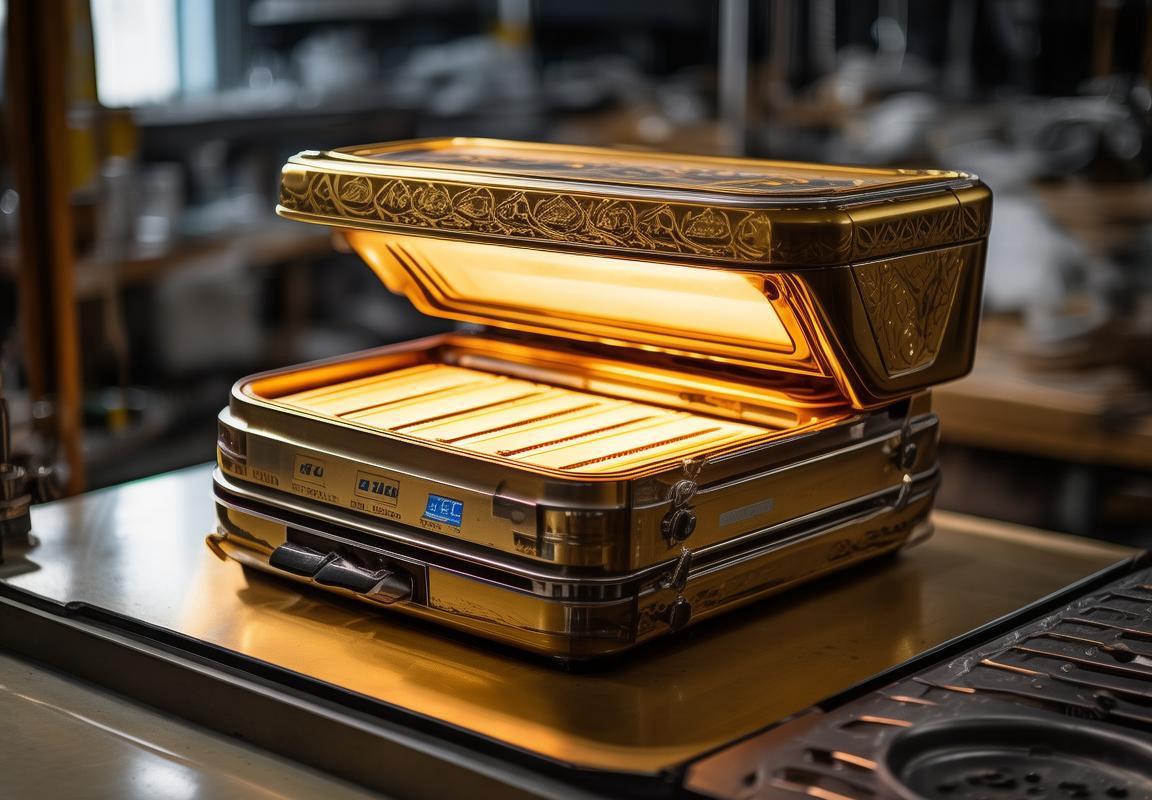
Case Studies: Success Stories with 4-Slice Sandwich Maker OEMs
In the competitive world of sandwich makers, partnering with a reputable OEM (Original Equipment Manufacturer) can make all the difference. Here are a few success stories that highlight the benefits of working with 4-slice sandwich maker OEMs:
-
Innovative Design Collaboration: One small bakery chain was looking to refresh its line of sandwich makers. They turned to an OEM to help them create a sleek, modern design that would appeal to their younger demographic. The OEM provided not just the hardware but also design input, resulting in a sandwich maker that became a talking point in the store and online.
-
Customizable Functionality: A popular café wanted to offer a variety of sandwich options but was limited by the standard features of their existing sandwich makers. They engaged with an OEM to develop a custom model that included additional heating elements and adjustable temperature controls. This allowed the café to cater to a wider range of customer preferences and dietary needs.
-
Quality Control and Consistency: A large-scale food service company required a high-volume 4-slice sandwich maker that could consistently produce sandwiches to a specific temperature and texture. The OEM worked closely with the company to ensure that the machines were not only robust but also easy to maintain. The result was a seamless integration into their production line, with minimal downtime and improved customer satisfaction.
-
Cost-Effective Production: A startup was looking to enter the sandwich market with a budget-friendly option. They partnered with an OEM that offered a cost-effective solution without compromising on quality. The OEM provided a scaled-down version of their standard 4-slice sandwich maker, tailored to the startup’s budget and volume requirements, allowing the new business to launch successfully.
-
Custom Branding and Logo Integration: A gourmet sandwich shop wanted to maintain its brand identity while also offering a high-quality sandwich maker to customers. The OEM was able to incorporate the shop’s logo and branding into the design of the sandwich maker, creating a seamless extension of the brand experience. This not only enhanced customer loyalty but also served as a marketing tool for the business.
-
After-Sales Support and Service: A global restaurant chain needed a reliable sandwich maker that could be easily transported and serviced in various locations around the world. The OEM provided comprehensive after-sales support, including training materials, troubleshooting guides, and a network of service technicians. This ensured that the chain could maintain its high standards of service regardless of location.
-
Energy Efficiency and Sustainability: A health-conscious café was seeking a sandwich maker that was not only efficient but also environmentally friendly. The OEM developed a model that used less energy and featured eco-friendly materials. This not only helped the café reduce its carbon footprint but also appealed to customers who were increasingly interested in sustainable practices.
-
Market Adaptation: An OEM worked with a food truck operator to create a compact, portable 4-slice sandwich maker that could be easily mounted in a vehicle. This innovative solution allowed the food truck to offer a variety of sandwiches on the go, without sacrificing quality or convenience.
-
Innovative Features for Special Diets: A bakery specializing in gluten-free and vegan products needed a sandwich maker that could handle a range of dietary requirements. The OEM customized a model that included separate heating zones to prevent cross-contamination and ensure that each sandwich was cooked to the right temperature without the risk of gluten exposure.
-
Custom Packaging and Presentation: A gourmet sandwich shop wanted to offer pre-packaged sandwiches that could be heated in the customer’s home. The OEM designed a sandwich maker that could be paired with custom packaging, complete with heating instructions and a QR code that linked to recipe videos. This created an interactive experience for customers and increased the shop’s online presence.
These case studies illustrate the versatility and innovation that 4-slice sandwich maker OEMs can bring to the table, from design and functionality to branding and sustainability. By working closely with OEMs, businesses can tailor their sandwich makers to meet their unique needs and stand out in a crowded market.
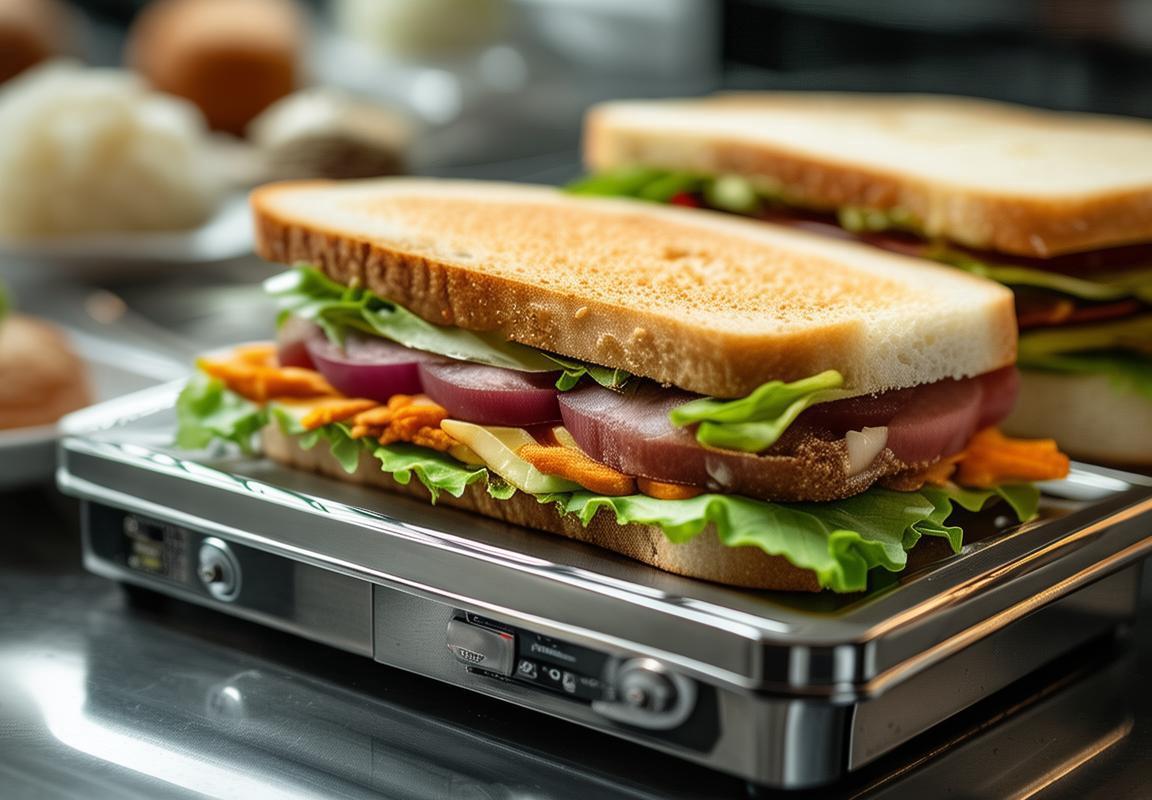
Final Thoughts on the Importance of 4-Slice Sandwich Maker OEM Partnerships
In the competitive world of sandwich makers, forming a partnership with an Original Equipment Manufacturer (OEM) can be a game-changer. These collaborations offer tailored solutions that cater to specific market needs, enhancing product differentiation and brand identity. Here are some final thoughts on why these partnerships are crucial for success in the 4-slice sandwich maker industry.
Design Flexibility and InnovationOne of the key benefits of working with a 4-slice sandwich maker OEM is the ability to innovate. OEMs can take your vision and turn it into a reality, offering design flexibility that can range from subtle enhancements to groundbreaking features. This collaboration allows for the creation of unique sandwich makers that stand out in a crowded market, appealing to consumers looking for something different.
Quality Control and ConsistencyWhen you partner with an OEM, you’re essentially outsourcing the manufacturing process to experts. This means that quality control is a top priority for them. From the selection of materials to the final assembly, OEMs ensure that each 4-slice sandwich maker meets the highest standards. This consistency in quality can be a significant selling point, as customers trust products that are known for their reliability.
Cost-Effective ProductionOEMs often operate on a large scale, which can lead to significant cost savings. By leveraging their economies of scale, OEMs can produce 4-slice sandwich makers at a lower cost per unit compared to in-house manufacturing. This not only reduces your overhead but also allows you to offer competitive pricing to your customers, potentially increasing market share.
Customization for Market TrendsThe food industry is always evolving, and staying ahead of trends is crucial. An OEM can help you customize your 4-slice sandwich makers to align with current market demands. Whether it’s a new heating element for quicker cooking times or a sleeker design that appeals to health-conscious consumers, OEMs can adapt quickly to ensure your product remains relevant.
Sustainability and Eco-Friendly OptionsIn today’s world, sustainability is a major concern for consumers and businesses alike. OEMs can assist in developing eco-friendly 4-slice sandwich makers that use recycled materials or energy-efficient components. This not only appeals to environmentally conscious customers but also positions your brand as a leader in responsible manufacturing practices.
Rapid Prototyping and IterationIf you’re introducing a new feature or a completely new product line, an OEM can provide rapid prototyping services. This means you can quickly iterate on your design, making necessary adjustments before full-scale production. This agility can be invaluable in the fast-paced foodservice industry, where being first to market can make all the difference.
Global Reach and DistributionMany OEMs have a global presence and can help you distribute your 4-slice sandwich makers to markets worldwide. This can open up new revenue streams and allow you to tap into international demand. By leveraging their established networks, you can navigate complex logistics and regulations, making global expansion smoother and more cost-effective.
Brand Integration and Co-Branding OpportunitiesAn OEM can also assist with brand integration, ensuring that your logo and brand identity are seamlessly incorporated into the design and functionality of the sandwich maker. Additionally, co-branding opportunities can arise, where your brand is associated with a respected OEM, enhancing your brand’s credibility and market appeal.
Customer Support and After-Sales ServiceA strong partnership with an OEM means access to their customer support and after-sales service. This can be crucial for maintaining customer satisfaction and loyalty. From technical assistance to warranty claims, having a reliable OEM partner means you can provide a high level of service to your customers, which is essential for long-term success.
Long-Term Strategic PlanningBy forming a partnership with an OEM, you’re not just producing a product; you’re investing in a long-term strategic relationship. This can lead to ongoing innovation, product development, and market adaptation. An OEM can become a trusted advisor, helping you plan for future market changes and ensuring your brand stays competitive.
In conclusion, the importance of 4-slice sandwich maker OEM partnerships cannot be overstated. From design flexibility and cost savings to market adaptation and global reach, these collaborations offer a multitude of benefits that can propel your brand to new heights. By choosing the right OEM partner, you’re not just manufacturing a product; you’re building a foundation for sustainable growth and innovation in the sandwich maker industry.